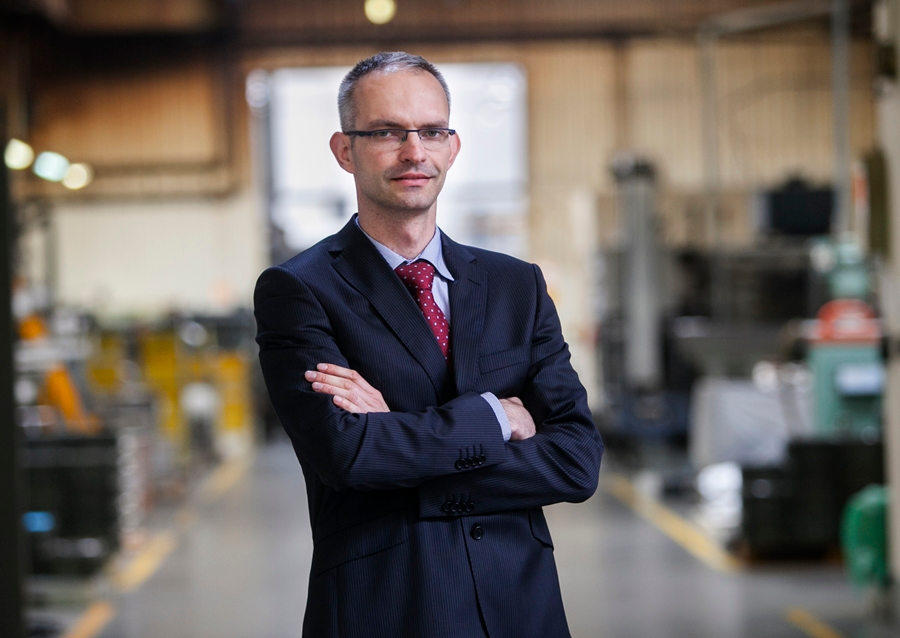Upon acquiring Stomil plants in Środa Wielkopolska (later moved to Nekla near Poznań) in 2002, the German group Alligator Ventilfabrik covered it by its corporate SAP system in the finance and controlling area (SAP FI, CO) as part of incorporating the new plant into the structures of the group. Over the subsequent years, the other business areas continued to be supported in the system previously used in the company.
“Our company, as part of the Group, took over the solutions proven in Germany from the parent company since its start. We wanted to have in our plants uniform ERP systems as the relationships between the companies in the group are very strong, a significant part of the trade turnover is generated within the group, and the exchange of data between the companies was properly configured (intercompany processes using EDI). Such a solution, based on work in two systems had worked well for many years, but it had some disadvantages, such as the maintenance of the necessary interfaces between the systems and the lack of prospects for further development. Therefore we made a strategic decision to implement a new SAP system with a wide range of functions in all plants of the group. That decision was also influenced by the dynamic growth of the Alligator Group in recent years and the growing requirements of our customers, particularly in the area of logistics and EDI data exchange,” in this way the decision about the system rollout was commented by Grzegorz Wincenciak, Sales and Marketing Manager at Alligator Polska, who is also the Project Manager.
First, the system was implemented at Alligator Ventilfabrik in Germany. The blueprint and implementation phase was carried out in the year 2013 and the system went live in January 2014.
In mid-2014, the project of the SAP ERP rollout from the German headquarters to Nekla was started. The project covered the following areas: controlling, sales and distribution, materials management and warehouse management as well as production planning and quality management. Of course, also in the previously implemented financial module it was necessary to introduce changes and to do work to integrate this area with the other parts of the business.
As a partner supporting Alligator Polska, the company BCC (now All for One Poland) was engaged in the project.
The project at Alligator can be described as a classic corporate rollout of the SAP solution to a local branch. According to the practice applied in the automotive industry, the rule was adopted to alleviate – as far as possible – the differences in business processes between branches, adapting them to the model adopted in the corporation. Therefore, in the rollout to Poland the only acceptable deviations from the system template were justified by differences in the Polish and German business legislation (finance, taxes).
At the opening of the project, a Fit & Gap analysis was carried out. Its goal was to identify the differences between the SAP system template for corporations and local legal needs as well as business practice. As the finance area (SAP FI), which usually generates the most discrepancies, had been implemented much earlier, the biggest differences were identified in the supply chain area.
The biggest development challenges included the adjustment of business processes to the corporate template and the change of habits, understanding the logic and learning how to use the adjusted processes by system users accustomed to different work standards.

Ewa Szeliga, Board Member, Alligator Polska
Better management, greater competitiveness
We expect that the integration of the SAP ERP system will enable comprehensive management of the company and increase its competitiveness on the market. The growing position of Alligator Polska in the Group entailed the need to adapt business processes of the company in Poland to the headquarters in Germany. The full observation of production processes and their impact on the management costs are the planned benefits of the system implementation. A fast and direct access to comprehensive data, the possibility of developing the system and creating reporting tools according to the management needs are further advantages resulting from the implementation. It becomes possible to meet the expectations of collaborators from the automotive industry regarding the possibility of connection and access to SAP systems used jointly for better customer service.
Of course, the system rollout entails costs, not only financial ones, but also related to the change of mentality and habits of employees, who must learn how to work in the new system and how to use it. Mutual system relationships require a change in the approach to planned or introduced changes in the system, not only on the part of Polish users, but also all other cooperation participants.
Extensive consultations between the parties lengthen the process of change introduction. However, the high requirements regarding security and data protection on the part of the parent company’s IT department entail the need for the system adaptation to specific criteria. This creates a feeling of comfort and safety of work in the system for all users. In addition, this feeling is further enhanced by the regular support provided by BCC following the implementation.
Ewa Szeliga, Board Member, Alligator Polska
Production
One of the major changes in the work method was the introduction of a new approach to handling production orders in SAP. The previous system allowed for opening orders well in advance, which did not have any consequences for other sections of the logistics chain. Alligator employees used this opportunity as a convenient form of production planning well in advance and became accustomed to it over the years.
The high degree of integration of business areas in the SAP system forced a change of these habits. The opening of a production order in SAP entails an automatic lock of materials in the MM module and implies the purchasing planning.
In addition, users also received new tools for confirming the production (a simplified interface available on touch panels), which also significantly changed the method of confirming the production on the production line.
The modeling of a change in the business process is one thing. In this case it was also necessary to change the users’ rhythm of work, to ensure a good understanding of the logic of the new process and its consequences, as well as to build “trust" in it.
Sales and purchasing
A regular practice as part of SAP rollouts to Polish companies in companies headquartered abroad is the preparation of the correction invoice handling process. This document is specific to our country and usually requires a corporate template to be extended to enable its issuing and handling in accordance with the Polish law and business practice.
Another constant element of rollouts to Poland is the preparation of printouts in Polish language and in line with the convention adopted in the company (invoices, correction invoices, orders, etc.).
In addition to the above adjustments, it was necessary to integrate SD and MM/WM areas at Alligator in the field of handling returnable packaging widely used in the automotive industry – its circulation between business partners is also reflected in the exchanged documents (invoices, orders).
In addition, in the MM area, a big scope of the system localization work was connected with the preparation of forms dedicated to Poland (orders, confirmation of orders, delivery notes, etc.). It is also a typical action of SAP rollouts.
The adjustment work was also required for the system extension used at Alligator to automate the creation of transfer orders.
Data migration and how to prepare for it
Due to the adopted strategy (reduction of the number of extensions and deviations from the template), the project of the rollout and adaptation of the system template to the needs of the Polish company was not complex as regards the configuration. The biggest challenges were associated with the organization and management of development work and preparation of data migration.
“Switching" from the old system to the new one required a temporary shutdown of production. This is a critical moment for the company – particularly in the automotive industry where plants producing components are part of a meticulous network of relationships between suppliers and customers, and contracts and deliveries are carried out in accordance with the just in time (hour-by-hour) strategy applied in the industry.
To minimize the project risk, special attention in the data migration process was paid to the development of a detailed production plan – prior to the production stoppage and after its resumption so as not to disrupt the continuity of supplies and to fulfill the agreements with key customers. A migration schedule was tested several times, including a few test inventories prior to the production stoppage. The purpose of these tests was to check the quality of the data to be migrated – that on this occasion were corrected and improved all the time, and to determine the precise length of the production downtime.
The preparation of good quality master data is a very important part of the rollout of projects, which is a responsibility of employees of the company in which the system is implemented. Typically, this stage is the biggest unknown in the project and involves the highest risk. But not at Alligator. Being aware of the threat to business continuity that can be posed by the low quality of data migrated to SAP, a lot of emphasis was put on their consistency, debugging and correct extraction of data from the old system.
To further minimize the risk, the persons responsible for the project at Alligator Polska decided to carry out the final migration to SAP as early as a month before the actual go live. The consequence of two go-lives in the project was the need to maintain current data in parallel in both systems in this one-month transition period.
Such an approach to the preparation and migration of master data required extensive mobilization and increased effort of the entire team of Alligator Polska. For members of working teams dealing with the rollout or implementation of the system, the involvement in the project always means more tasks to be performed – in addition to the current ones, and each test migration and inventory entails the need to work over the weekend. However, in this case, the effort paid off. The production downtime lasted only two weeks and did not affect the continuity of supplies. And at the time of the go live, the difference in the opening balance between the old system and the new one was only … one grosch!

Grzegorz Wincenciak, Sales and Marketing Manager, Alligator Polska
Grzegorz Wincenciak comments on the sources of this success: “The project was for us a big organizational challenge, the success of which depended primarily on a carefully selected implementation team. We prepared the organizational structure of the project as early as in 2013, assigning to each of the modules a key user, his/her substitute, and a team of subordinates. Key users responsible for individual modules were selected according to a specific key: they were people with many years of professional experience, with a substantive knowledge, and empowered to make decisions on their own – mostly heads of departments. The knowledge of a foreign language was also very important since the project required daily contacts and arrangements with colleagues at headquarters in Germany. To achieve a final success, the team of several dozen people had to receive adequate support from both the Project Management and the Board, and the project itself – as strategic for the company – received the number 1 priority. The tasks of the Project Manager and individual key users included motivating key employees on a continuous basis and convincing them that all problems that arose along the way could be solved. A methodical, task-based approach to the project, hundreds of meetings, joint testing, the appropriate setting of partial goals and increasing the workload as the go live approached had the intended effect. In order to reduce the high stress of people involved in the project at least a little, several events integrating the team outside the company were planned. Financial incentives were also prepared. The atmosphere in the project was very important to us and was one of the elements assessed on an ongoing basis by the project management and the Steering Committee at Alligator Polska and the headquarters in Germany.“
Multiple stakeholders of the project
Many partners participating in the project posed another big challenge. Four stakeholders: the company’s headquarters, its SAP partner, local subsidiary and local partner – is a standard in rollout projects. In this case, there was the fifth stakeholder of the project – a company that developed a system extension operating at Alligator – an application providing a simplified interface for confirming production in the SAP system, operating on touch panels. This extension was also launched in the Polish company. Configuration changes by the manufacturer of the application were necessary for its synchronization and integration with the controlling functions of the system.
The role of BCC in the rollout of SAP to Alligator Polska was to develop solutions which took into account the specific features of the Polish business and law, and to carry out testing and user training. Due to the limited involvement of the corporate partner SAP, BCC took over also overseeing the coordination of the whole work, the schedule, monitoring the completion of work by the other project stakeholders and identifying challenges and counteracting problems (reacting to delays, verification of the schedule etc.).
Alligator is a company with headquarters in Germany, so German was the official language of the project (documentation). But the company operates worldwide (another rollout of the system, in early 2015, was made to a branch in the United States) and English language was also used in the project communication. This flexibility facilitated ongoing communication.
“The project was difficult and required a huge effort of the implementation team and working extra hours very often. The objective of the rollout was to transfer the largest possible number of proven solutions and settings from Germany, and above all not to disrupt current operations and production. The biggest challenge in the project, due to the specific nature of the rollout, was the coordination the project stakeholders’ work and the need for continuous arrangements to be made on the Polish and German side. Any deviations from the template implemented earlier at the headquarters had to be mutually tested due to the possible impact on all the plants operating in one system environment,” adds Grzegorz Wincenciak.
The new year, 2015, was begun at Alligator Polska in the new integrated SAP environment covering all business areas. The extensive work done during the project enabled a smooth “transition" into the new system, and the Polish branch confirmed its important position in the structure of the corporation.

